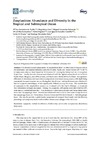Identificador persistente para citar o vincular este elemento:
https://accedacris.ulpgc.es/jspui/handle/10553/58410
| Title: | Zooplankton abundance and diversity in the tropical and subtropical ocean | Authors: | de Puelles, Ma Luz Fernández Gazá, Magdalena Cabanellas-Reboredo, Miguel Santandreu, Ma del Mar Irigoien, Xabier González-Gordillo, Juan Ignacio Duarte, Carlos M. Hernández-León, Santiago |
UNESCO Clasification: | 251001 Oceanografía biológica | Keywords: | Copepods Vertical distribution Biodiversity Community composition Abundance, et al |
Issue Date: | 2019 | Project: | Expedición de Circunnavegación Malaspina 2010: Cambio Global y Exploración Del Océano Global "Migradores y Flujo Activo en El Océano Atlántico" Biomasa y Flujo Activo en la Zona Batipelágica |
Journal: | Diversity | Abstract: | The abundance and composition of zooplankton down to 3000 m depth was studied in the subtropical and tropical latitudes across the Atlantic, Pacific and Indian Oceans (35 °N-40 °S). Samples were collected from December 2010 to June 2011 during the Malaspina Circumnavigation Expedition. Usually, low abundances were observed with the highest values found in the North Pacific Ocean, Benguela, and off Mauritania, and the lowest in the South Pacific Ocean. No significant differences in abundance and zooplankton composition were found among oceans, with depth being consistently the most important factor affecting their distribution. Each depth strata were inhabited by distinct copepod assemblages, which significantly differed among the strata. The contribution of copepods to the zooplankton community increased with the depth although, as expected, their abundance strongly decreased. Among the copepods, 265 species were identified but 85% were rare and contributed less than 1% in abundance. Clausocalanus furcatus and Nannocalanus minor dominated the epipelagic strata. Pleuromamma abdominalis and Lucicutia clausi were of importance in the mesopelagic layer, and Pareucalanus, Triconia, Conaea and Metridia brevicauda in the bathypelagic layer. Our results provide a global-scale assessment of copepod biodiversity and distribution, providing a contemporary benchmark to follow future ocean changes at low latitudes. | URI: | https://accedacris.ulpgc.es/handle/10553/58410 | ISSN: | 1424-2818 | DOI: | 10.3390/d11110203 | Source: | Diversity [ISSN 1424-2818], v. 11 (11), 203 |
| Appears in Collections: | Artículos |
SCOPUSTM
Citations
29
checked on Jun 8, 2025
WEB OF SCIENCETM
Citations
25
checked on Jun 8, 2025
Page view(s)
166
checked on Aug 31, 2024
Download(s)
149
checked on Aug 31, 2024
Google ScholarTM
Check
Altmetric
Share
Export metadata
Items in accedaCRIS are protected by copyright, with all rights reserved, unless otherwise indicated.
